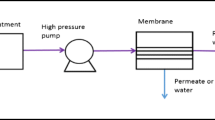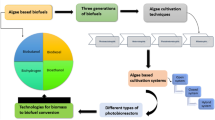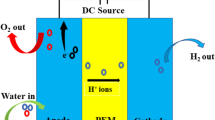Abstract
In this work, experimental work is presented on the performance of a hybrid solar distiller comprising solar still (SS) combined with parabolic trough solar collector (PTSC) using direct heating of salty water by the collector. In this technique, the salty water supplied to the SS is heated by passing it directly through the parabolic receiver without using heat transfer mediums that reduce the system efficiency. The study is carried out at different salty water depths inside the SS basin under hot climate conditions of Upper Egypt. The system performance is compared with a previous system using oil as a heat transfer medium between PTSC and still (indirect heating). The advantages of this technique are its ability to reduce initial salty water depth in the basin and avoid using the pumping system and heat exchanger compared to the direct heating. The performance of the proposed system is evaluated based on productivity, energy payback time (EPBT), exergy, enviroeconomic, and exergoeconomic methodologies. Findings illustrate that the present system rises the energy efficiency by about 12%, 27.5%, and 46% and the system exergy efficiency by about 14%, 30%, and 49% at salty water depth 15 mm, 10 mm, and 5 mm in the basin compared with the indirect heating system. Moreover, using this technique of salty water heating reduces the production cost of freshwater by about 71% compared with the direct heating system. The exergoeconomic and enviroeconomic parameters of the direct heating mechanism are more effective compared with those of the indirect heating mechanism.








Similar content being viewed by others
Data availability
All data generated or analyzed during this study are included only in this paper and are not available in any other works.
References
Abd Elbar AR, Hassan H (2019a) An experimental work on the performance of solar still incorporating with wind turbine and thermal energy storage unit. 24492:1–11. https://doi.org/10.5004/dwt.2019.24492
Abd Elbar AR, Hassan H (2019b) An experimental work on the performance of solar still incorporating with wind turbine and thermal energy storage unit. Desalin Water Treat 165:24–34. https://doi.org/10.5004/dwt.2019.24492
Abd Elbar AR, Hassan H (2019c) Experimental investigation on the impact of thermal energy storage on the solar still performance coupled with PV module via new integration. Sol Energy 184:584–593. https://doi.org/10.1016/j.solener.2019.04.042
Abd Elbar AR, Hassan H (2020a) An experimental work on the performance of new integration of photovoltaic panel with solar still in semi-arid climate conditions. Renew Energy 146:1429–1443. https://doi.org/10.1016/j.renene.2019.07.069
Abd Elbar AR, Hassan H (2020b) Enhancement of hybrid solar desalination system composed of solar panel and solar still by using porous material and saline water preheating. Sol Energy 204:382–394. https://doi.org/10.1016/j.solener.2020.04.058
Abd Elbar AR, Yousef MS, Hassan H (2019) Energy, exergy, exergoeconomic and enviroeconomic (4E) evaluation of a new integration of solar still with photovoltaic panel. J Clean Prod 233:665–680. https://doi.org/10.1016/j.jclepro.2019.06.111
Al-Molhem YA, Eltawil MA (2020) Enhancing the double-slope solar still performance using simple solar collector and floatable black wicks. Environ Sci Pollut Res. https://doi.org/10.1007/s11356-020-09509-2
Arunkumar T, Denkenberger D, Velraj R, et al (2015) Experimental study on a parabolic concentrator assisted solar desalting system. ENERGY Convers Manag 105:665–674. https://doi.org/10.1016/j.enconman.2015.08.021
Bahrami M, Avargani VM, Bonyadi M (2019) Comprehensive experimental and theoretical study of a novel still coupled to a solar dish concentrator. Appl Therm Eng. https://doi.org/10.1016/j.applthermaleng.2019.01.103
Bait O (2019) Exergy, environ–economic and economic analyses of a tubular solar water heater assisted solar still. J Clean Prod 435:140–151. https://doi.org/10.1016/j.jclepro.2018.12.015
Balachandran GB, David PW, Mariappan RK et al (2019a) Improvising the efficiency of single-sloped solar still using thermally conductive nano-ferric oxide. Environ Sci Pollut Res:32191–32204. https://doi.org/10.1007/s11356-019-06661-2
Balachandran GB, David PW, Vijayakumar ABP et al (2019b) Enhancement of PV/T-integrated single slope solar desalination still productivity using water film cooling and hybrid composite insulation. Environ Sci Pollut Res:32179–32190. https://doi.org/10.1007/s11356-019-06131-9
Buehler R, Yang S, Ordonez JC (2017) Heat transfer fluids for parabolic trough solar collectors - A comparative study. 2016 IEEE Conf Technol Sustain SusTech 2016:68–75. https://doi.org/10.1109/SusTech.2016.7897145
Deniz E, Çınar S (2016) Energy, exergy, economic and environmental (4E) analysis of a solar desalination system with humidification-dehumidification. Energy Convers Manag 126:12–19. https://doi.org/10.1016/j.enconman.2016.07.064
Dumka P, Mishra DR (2019) Influence of salt concentration on the performance characteristics of passive solar still. Int J Ambient Energy 0:1–11. https://doi.org/10.1080/01430750.2019.1611638
Dumka P, Mishra DR (2020) An estimation of the distillate output from a CSS based on multi-variable regression analysis. Int J Ambient Energy 0:1–10. https://doi.org/10.1080/01430750.2020.1736625
Elashmawy M (2020) Improving the performance of a parabolic concentrator solar tracking- tubular solar still ( PCST-TSS ) using gravel as a sensible heat storage material. Desalination 473:114182. https://doi.org/10.1016/j.desal.2019.114182
Fathy M, Hassan H, Salem AM (2018) Experimental study on the effect of coupling parabolic trough collector with double slope solar still on its performance. Sol Energy 163:54–61. https://doi.org/10.1016/j.solener.2018.01.043
Feilizadeh M, Estahbanati MRK, Khorram M, Rahimpour MR (2019) Experimental investigation of an active thermosyphon solar still with enhanced condenser. Renew Energy 143:328–334. https://doi.org/10.1016/j.renene.2019.05.013
Gaur A, Tiwari GN (2014) Exergoeconomic and Enviroeconomic Analysis of Photovoltaic Modules of Different Solar Cells. 2014
Han CM, Waks E, Shapiro B (2020) Mathematical modeling and experimental validation for expression microdissection. Appl Opt 59:5870–5880. https://doi.org/10.1364/AO.395864
Hassan H (2019) Comparing the performance of passive and active double and single slope solar stills incorporated with parabolic trough collector via energy, exergy and productivity. Renew Energy. https://doi.org/10.1016/j.renene.2019.10.050
Hassan H, Yousef MS (2020) An assessment of energy, exergy and CO2 emissions of a solar desalination system under hot climate conditions. Process Saf Environ Prot 145:157–171. https://doi.org/10.1016/j.psep.2020.07.043
Hassan H, Salem MA, Fathy M (2019) Experimental work on the effect of saline water medium on the performance of solar still with tracked parabolic trough collector. Renew Energy 135:136–147. https://doi.org/10.1016/j.renene.2018.11.112
Hassan H, Ahmed MS, Fathy M, Yousef MS (2020a) Impact of salty water medium and condenser on the performance of single acting solar still incorporated with parabolic trough collector. Desalination 480:114324. https://doi.org/10.1016/j.desal.2020.114324
Hassan H, Yousef MS, Ahmed MS, Fathy M (2020b) Energy, exergy, environmental, and economic analysis of natural and forced cooling of solar still with porous media. Environ Sci Pollut Res. https://doi.org/10.1007/s11356-020-09995-4
Hassan H, Yousef MS, Fathy M, Ahmed MS (2020c) Impact of condenser heat transfer on energy and exergy performance of active single slope solar still under hot climate conditions. Sol Energy 204:79–89. https://doi.org/10.1016/j.solener.2020.04.026
Hassan H, Yousef MS, Fathy M, Ahmed MS (2020d) Assessment of parabolic trough solar collector assisted solar still at various saline water mediums via energy, exergy, exergoeconomic, and enviroeconomic approaches. Renew Energy 155:604–616. https://doi.org/10.1016/j.renene.2020.03.126
Kabeel AE, Abdelgaied M (2017) Observational study of modified solar still coupled with oil serpentine loop from cylindrical parabolic concentrator and phase changing material under basin. Sol Energy 144:71–78. https://doi.org/10.1016/j.solener.2017.01.007
Kabeel AE, Abdelgaied M (2019) Performance enhancement of a photovoltaic panel with reflectors and cooling coupled to a solar still with air injection. J Clean Prod. https://doi.org/10.1016/j.jclepro.2019.03.199
Kabeel AE, El-Agouz ES, Athikesavan MM et al (2019a) Comparative analysis on freshwater yield from conventional basin-type single slope solar still with cement-coated red bricks: an experimental approach. Environ Sci Pollut Res:32218–32228. https://doi.org/10.1007/s11356-019-07288-z
Kabeel AE, Khairat MM, Ramzy K et al (2019b) Enhancement of single solar still integrated with solar dishes : An experimental approach. Energy Convers Manag 196:165–174. https://doi.org/10.1016/j.enconman.2019.05.112
Madiouli J, Lashin A, Shigidi I, et al (2020) Experimental study and evaluation of single slope solar still combined with flat plate collector, parabolic trough and packed bed. Sol Energy 196:358–366. https://doi.org/10.1016/j.solener.2019.12.027
Malik MZ, Musharavati F, Khanmohammadi S, Khanmohammadi S (2020) Solar still desalination system equipped with paraffin as phase change material : exergoeconomic analysis and multi-objective optimization
Manchanda H, Kumar M (2018) Study of water desalination techniques and a review on active solar distillation methods. Environ Prog Sustain Energy 37:444–464. https://doi.org/10.1002/ep.12657
Manokar AM, Winston DP, Kabeel AE et al (2017) Integrated PV / T solar still- A mini-review. Desalination:0–1. https://doi.org/10.1016/j.desal.2017.04.022
Manokar AM, Vimala M, Winston DP, Ramesh R (2019) Different parameters affecting the condensation rate on an active solar still: a review. Environ Sustain 38:286–296. https://doi.org/10.1002/ep.12923
Marif Y, Benmoussa H, Bouguettaia H et al (2014) Numerical simulation of solar parabolic trough collector performance in the Algeria Saharan region. Energy Convers Manag 85:521–529. https://doi.org/10.1016/j.enconman.2014.06.002
Mu L, Xu X, Williams T et al (2019) Enhancing the performance of a single-basin single-slope solar still by using Fresnel lens : Experimental study. J Clean Prod 239:118094. https://doi.org/10.1016/j.jclepro.2019.118094
Muftah AF, Alghoul MA, Fudholi A et al (2014) Factors affecting basin type solar still productivity: A detailed review. Renew Sust Energ Rev 32:430–447. https://doi.org/10.1016/j.rser.2013.12.052
Nazari S, Safarzadeh H, Bahiraei M (2019a) Performance improvement of a single slope solar still by employing thermoelectric cooling channel and copper oxide nanofluid: An experimental study. J Clean Prod 208:1041–1052. https://doi.org/10.1016/j.jclepro.2018.10.194
Nazari S, Safarzadeh H, Bahiraei M (2019b) Experimental and analytical investigations of productivity, energy and exergy efficiency of a single slope solar still enhanced with thermoelectric channel and nanofluid. Renew Energy 135:729–744. https://doi.org/10.1016/j.renene.2018.12.059
Omara ZM, Abdullah AS, Kabeel AE, Essa FA (2017) The cooling techniques of the solar stills ’ glass covers – A review. Renew Sust Energ Rev 78:176–193. https://doi.org/10.1016/j.rser.2017.04.085
Petela R (2003) Exergy of undiluted thermal radiation. Sol Energy 74:469–488. https://doi.org/10.1016/S0038-092X(03)00226-3
Sahota L, Tiwari GN (2017) Exergoeconomic and enviroeconomic analyses of hybrid double slope solar still loaded with nanofluids. Energy Convers Manag 148:413–430. https://doi.org/10.1016/j.enconman.2017.05.068
Sathyamurthy R, El-agouz SA, Nagarajan PK, Subramani J (2016) A Review of integrating solar collectors to solar still. Renew Sust Energ Rev 77:1069–1097
Selvaraj K, Natarajan A (2017) Factors influencing the performance and productivity of solar stills - A review. Desalination:0–1. https://doi.org/10.1016/j.desal.2017.09.031
Shadi M, Abujazar S, Fatihah S et al (2016) The effects of design parameters on productivity performance of a solar still for seawater desalination: A review. Desalination 385:178–193. https://doi.org/10.1016/j.desal.2016.02.025
Taylor JR (1997) An introduction to error analysis : the study of uncertainties in physical measurements. University Science Books
Yousef MS, Hassan H (2019a) An experimental work on the performance of single slope solar still incorporated with latent heat storage system in hot climate conditions. J Clean Prod 209:1396–1410. https://doi.org/10.1016/j.jclepro.2018.11.120
Yousef MS, Hassan H (2019b) Energetic and exergetic performance assessment of the inclusion of phase change materials (PCM) in a solar distillation system. Energy Convers Manag 179:349–361. https://doi.org/10.1016/j.enconman.2018.10.078
Yousef MS, Hassan H (2019c) Assessment of different passive solar stills via exergoeconomic , exergoenvironmental , and exergoenviroeconomic approaches : A comparative study. Sol Energy 182:316–331. https://doi.org/10.1016/j.solener.2019.02.042
Yousef MS, Hassan H (2020) Energy payback time, exergoeconomic and enviroeconomic analyses of using thermal energy storage system with a solar desalination system: An experimental study. J Clean Prod 270:122082. https://doi.org/10.1016/j.jclepro.2020.122082
Yousef MS, Hassan H, Ahmed M, Ookawara S (2017) Energy and exergy analysis of single slope passive solar still under Egyptian climate conditions. Energy Procedia 141:18–23. https://doi.org/10.1016/j.egypro.2017.11.005
Yousef MS, Hassan H, Kodama S, Sekiguchi H (2019a) An experimental study on the performance of single slope solar still integrated with a PCM-based pin-finned heat sink. Energy Procedia 156:100–104. https://doi.org/10.1016/j.egypro.2018.11.102
Yousef MS, Hassan H, Sekiguchi H (2019b) Energy , exergy , economic and enviroeconomic ( 4E ) analyses of solar distillation system using different absorbing materials. Appl Therm Eng 150:30–41. https://doi.org/10.1016/j.applthermaleng.2019.01.005
Funding
The authors did not receive support from any organization for the submitted work.
Author information
Authors and Affiliations
Contributions
Hamady Hassan: Writing the draft paper, analysis results, preparing data, revising the manuscript, preparing the revised version.
Mohamed S. Yousef: Writing part of the draft paper, analysis results, preparing data.
Mohamed Fathy: Caried out the experimental work and obtained the experimental data.
Corresponding author
Ethics declarations
Conflict of interests
The authors disclose any actual or potential conflict of interest including any financial, personal or other relationships with other people or organizations within three years of beginning the submitted work that could inappropriately influence, or perceived to influence, this work.
Consent to publish
The authors grant the publisher the sole and exclusive license of the full copyright in the contribution.
Ethics approval and consent to participate
All procedures performed in this study were in accordance with the ethical standards of the institutional and/or national research and ethical standards.
Additional information
Responsible editor: Philippe Garrigues
Publisher’s note
Springer Nature remains neutral with regard to jurisdictional claims in published maps and institutional affiliations.
Rights and permissions
About this article
Cite this article
Hassan, H., Yousef, M.S. & Fathy, M. Productivity, exergy, exergoeconomic, and enviroeconomic assessment of hybrid solar distiller using direct salty water heating. Environ Sci Pollut Res 28, 5482–5494 (2021). https://doi.org/10.1007/s11356-020-10803-2
Received:
Accepted:
Published:
Issue Date:
DOI: https://doi.org/10.1007/s11356-020-10803-2




